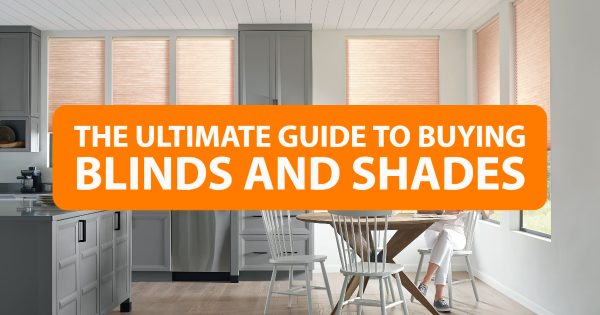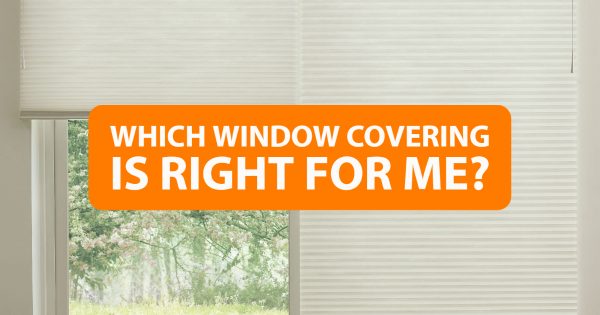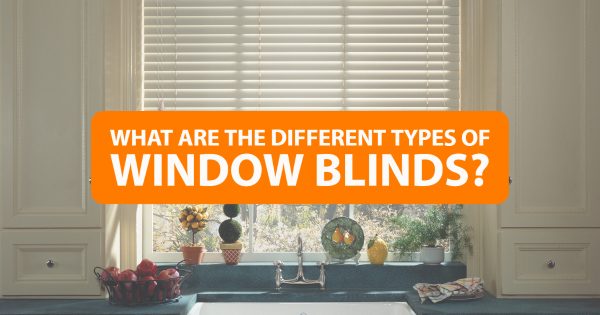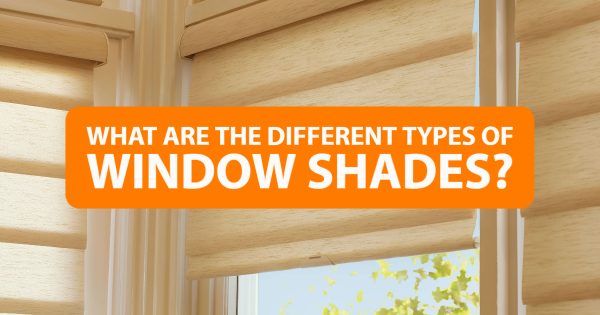The Ultimate Guide to Buying Blinds and Shades

Your windows are a major focal point in your home, and finding the right treatments for them can feel like a daunting task. After all, you not only want your window coverings to be functional but also stylish and chic. The good news is that we're here to help guide you along the way toward finding the perfect blinds or shades for your home.
Whether you're considering Roman shades, wood and metal blinds, or roller and solar shades, chances are you have a lot of questions about your potential window coverings that are keeping you from making a final decision. That being said, if you're not sure where to start, here are the essentials you need to know for choosing the right blinds or shades for your space.
BLINDS VS. SHADES: WHAT'S THE DIFFERENCE?
The first thing you need to know when you're choosing window coverings for your home is the difference between blinds and shades. While all window coverings are designed to give you as much or as little natural light and privacy as you'd like, blinds and shades do have their differences. Knowing those differences can help you find the most functional and stylish window treatment options for you.
Blinds are a type of window covering that is made of slats or vanes. Slats are typically made of wood, plastic, aluminum, or PVC. Slats can be large or very small, and they can be opened or closed using a tilt wand. The slats can also be raised up or down using a cord or, if the blinds are cordless, using gentle pushing or pulling.
Shades are a type of window covering that is made from fabric or soft paper. Unlike blinds, shades are made up of one continuous layer of fabric and can be folded or rolled up or down. Some shades, such as cellular shades, are folded in pleats and come in various pleat sizes. Shades can come in thicker materials to create blackout window coverings or they can be made sheer. Because shades are often made from fabric, they come in various colors and can be either neutral or bold depending on your style preference.

WHICH WINDOW COVERING IS RIGHT FOR ME?
Different homeowners have different preferences for blinds or shades depending on their personal style and their practical needs. For instance, while closed blinds will help to keep out sunlight on bright or hot days, they may not be able to keep the sun out completely. Shades, on the other hand, can be made with blackout fabric to keep out natural light.
You may prefer window shades over blinds if you work at night or have a home office that needs window coverings to keep out any sun glare. On the flipside, blinds are a great option if you want to let in as much natural light into your home as possible while still maintaining privacy.
As you can tell, there are many factors to consider when choosing window coverings for your home. The good news is that, by knowing what you need from your window coverings, you can narrow down the list of potential style options. Let's take a look at some of the key things you ought to consider when choosing blinds and shades.
IMPORTANT FACTORS TO CONSIDER WHEN CHOOSING WINDOW COVERINGS
Whether you have pets or kids: If you have pets or kids in your family, opt for choosing blinds or shades that are cordless. Cordless blinds and shades are child-safe and prevent accidental strangulation, choking, and injury.
Your need for natural light: Natural light may not be a problem in your home if you have several windows. But, if your home doesn't have many windows or you're facing a part of the street that doesn't get a lot of sunlight, you may want to consider blinds or shades that let in more light. For a brighter room, consider sheer shades or blinds with wider slats. Smaller blind slats have less space between each slat, which means there's less space for the sun to come through.
Whether sun glare is your nemesis: As we mentioned earlier, it's a good idea to consider your lifestyle when you're choosing the type of window coverings to get for your home. If you work nights, you work from home, frequently use your computer, or your TV often gets hit with sun glare in the middle of the day, it's in your best interest to choose window coverings that can block sunlight. Blackout shades are a great option for keeping out sun glare, and you can raise or lower your shades from the top or bottom of the window to control how much light you let into your home.
Your personal style: When you're choosing your window coverings, it's just as important for you to like them as it is for your window treatments to be functional. Remember that your window treatments are often the first thing someone notices when they walk into your home. Ask yourself whether you prefer more traditional window coverings or you prefer something more casual and comfortable. Do you like natural wood tones or do you prefer something that's airy and doesn't distract from the rest of the room?
The style of your home: One of the best ways to make sure that your home's interior design looks great is to work with your home's architecture and not against it. If you have a good idea of what your personal style is, consider how the options available to you would look best with your home's structural features. For instance, if you have a farmhouse with gorgeous wood beams, using that same wood tone in your blinds could be a great way to continue that style throughout your house.
Your cleaning schedule: Consider how often you clean your home and whether you'd rather dust or spot-clean. Because blinds aren't made from fabric, you don't have to worry about any staining, but you do have to worry about dust. According to Bob Vila, it's recommended to dust your blinds at least once a week. You can do this by closing your blinds and dusting them gently with a feather duster, soft cloth, or microfiber duster in the direction of the slats. Fabric shades can be lightly vacuumed and spot-cleaned using mild soap and water.
Your need for privacy: Everybody needs their privacy, but sometimes you need more privacy depending on where your home is located. Anyone living on a busy street or close to their neighbors may prefer window coverings that offer more privacy compared to someone living in a rural area. Shades with thicker fabrics will offer more privacy than shades with thinner fabrics, and blinds with thinner slats will offer more privacy than those with thicker slats.
Your budget: Ultimately, some styles of window coverings will be more expensive than others, and so it's a good idea to make sure that you have a set budget in mind. Are you looking for window coverings for just one room such as your living room or child's bedroom? Or are you interested in new window coverings for your entire home? How large are the windows you plan to cover? Keep in mind that the larger the window, the higher in price your window covering will be.
Now that you've considered the factors behind choosing the right window coverings for your home and you have a general idea of what to look for, it's time to take a look at some of the different types of window blinds and shades there are to choose from.

WHAT ARE THE DIFFERENT TYPES OF WINDOW BLINDS?
Blinds are one of the most popular types of window coverings because they allow you to let in as much or as little sunlight as you'd like. However, many homeowners assume that window blinds only come available in the white, mini blind design that often comes styled in most apartment buildings. To give you a better idea of the different types of blinds out there, here are some of the most popular design styles:
Vertical blinds: Vertical blinds are great for large windows. They add visual height and are ideal for sliding glass doors and other windows that may be difficult to find window treatments for. Additionally, vertical blinds provide plenty of privacy while also letting in plenty of natural light.
Venetian blinds: Venetian blinds are considered the number one most popular style of window blinds. They consist of 2-inch wide horizontal slats made from wood, plastic, or aluminum and they're attached to one another with cloth or string. When you raise your Venetian blinds, the bottom slat is pressed up into the slat above. These types of blinds are highly durable and easy to use.
Mini blinds: Mini blinds are often seen in apartment rentals and are a variation of Venetian blinds. Mini blinds are typically made from plastic or PVC and operate similarly to Venetian blinds where the bottom slat is pressed up into the slat above when the blinds are raised. However, mini blinds have smaller slats than Venetian blinds and are typically 1-inch wide.
Micro blinds: Micro blinds are similar to mini blinds, but are even smaller than their predecessor. Micro blinds have slats that are only half an inch thick.
Panel blinds: Panel blinds, also called panel shades, are a type of window treatment that's used for sliding doors. These blinds are installed on a track, which allows homeowners to maintain their privacy while their sliding door is open or closed.
Metal/aluminum blinds: Metal blinds are a chic and sophisticated window treatment. They come available in a wide variety of finishes and textures including matte and metallic. Metal blinds are highly durable and can be made with room darkening technology.

WHAT ARE THE DIFFERENT TYPES OF WINDOW SHADES?
Just like window blinds, window shades also come in a wide range of styles and materials. This makes them ideal for homeowners whether you're looking to make your window coverings stand out or have a more neutral appearance. Some of the most popular choices for window shades include:
Roller shades: Roller shades are highly preferred by many homeowners because they're adaptable. They pair well with a wide range of aesthetics including traditional, minimalist, modern, and even maximalist so you don't need to worry about your window coverings clashing with your style. Roller shades also have a great sense of style on their own because their clean lines and light, airy appearance creates a sense of gentle coziness. Finally, roller shades are great because they can suit all types of windows and don't require cords, which makes them flexible to use around your home and safe for children's bedrooms.
Roman shades: Roman shades are made completely from fabric, and they're extremely flexible in their design options. You can choose solid colors or patterned fabric, and you can choose from a wide range of materials. Like roller shades, Roman shades can come cordless, which makes them great for children's rooms.
Cellular shades: Cellular shades have a distinctive pleated style that makes them truly unique. They add a sense of visual interest and can be raised or lowered in the window from the top down or from the bottom up. This means you can close your windows part-way to enjoy some privacy while still letting in plenty of light.
Transitional shades: Transitional shades are made of dual-layered fabric that creates the effect of a shade when the window treatment is closed and the effect of a blind when it's opened. Transitional shades have a contemporary design that's unique and eye-catching with signature horizontal stripes.
Solar shades: Solar shades are a type of window treatment that was made specifically to reduce UV exposure in your home. Solar shades have a tighter weave, which lets in less sunlight compared to other types of window shades. This way, you can let in natural light without the glare and the harmful UV rays.
With the different styles of window blinds and shades in mind, it's time to start shopping. Unfortunately, many homeowners often realize that standard blinds and shades aren't always the best option for their homes. Fortunately, custom window coverings are a great alternative to standard blinds and shades because they offer a wide range of benefits.
WHAT ARE THE BENEFITS OF CUSTOM WINDOW COVERINGS?
Custom window coverings are made specifically to suit your windows and the style of your home. This makes them ideal for homeowners who have been struggling to find window coverings that they find appealing. Other advantages you can look forward to when you choose custom window treatments include:
Endless design options: When you're working with standard blinds and shades, you're limited to a select number of colors and design options. With custom window blinds and shades, that isn't the case. You have greater access to different colors and patterns so you can feel confident knowing you're getting window coverings that match your unique style.
Greater energy efficiency: It's important to make sure when you choose window coverings that they fully cover your windows. According to the U.S. Department of Energy, heat loss and heat gain through windows are responsible for 20-35% of residential energy use. Window treatments that fully cover your window allow less heat to escape during the winter months and less UV light to enter your home during the summer. Custom window blinds and shades are fitted to your windows so you can rest assured that they'll be as energy-efficient as possible.
Higher quality materials: When you're buying standard blinds and shades, it can be difficult to gauge the quality of the materials you're working with because you may not be familiar with the manufacturer, just the distributor. That isn't the case when you choose custom window blinds and shades. By opting to install custom window treatments, you know exactly who your manufacturer is and you know the quality of the materials they're using to create the window coverings you need.
Right fit on the first try: It can be challenging to find standard blinds or shades that properly match the measurements of your windows. When you opt for custom blinds or shades, you can have peace of mind knowing your window coverings will fit perfectly the first time without having to try out different options.
READY TO CHOOSE YOUR WINDOW COVERINGS?
If you're ready to choose custom window coverings for your home, our professional and experienced team at Window Treats Inc. is there for you. We have years of experience in the industry helping homeowners and interior designers just like you find the right blinds or shades to suit their needs, personal style, and budget.
Whether you're looking for bold roller shades for your living room or Venetian blinds for your master bedroom, we've got you covered. Contact Window Treats Inc. today for more information about our custom window treatments. We'll be happy to answer any questions you may have.
Window Treats Inc in Red Bank New Jersey also has a showroom in Brooklyn New York and offers Hunter Douglas window treatments including curtains, blinds, shades, drapery, and shutters. These can all be made into motorized blinds, shades, and drapery, and integrated into a home automation system. Window Treats proudly serves the surrounding areas, including Allenhurst, Asbury Park, Colts Neck, Deal, Eatontown, Elberon, Fair Haven, Freehold, Holmdel, Lakewood, Little Silver, Lincroft, Middletown, Monmouth Beach, Oakhurst & Ocean Township, Rumson, Shrewsbury, Spring Lake, Tinton Falls and Toms River. Our team is often called upon to serve the tri-state area as well including Brooklyn and Manhattan (New York City).




